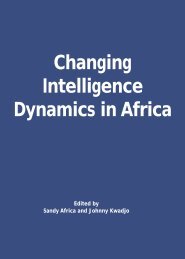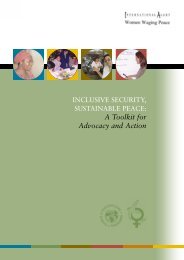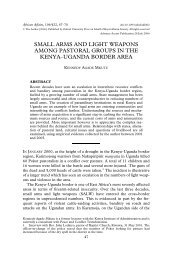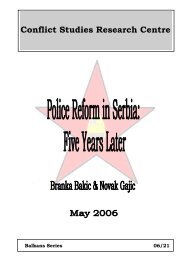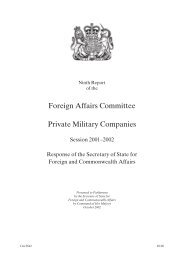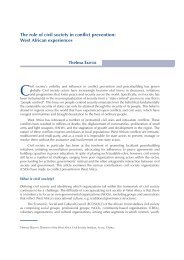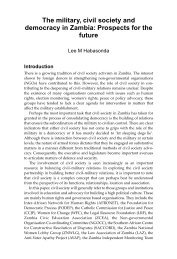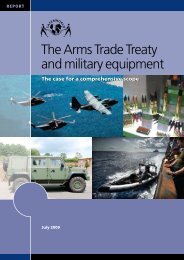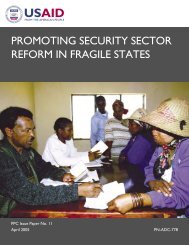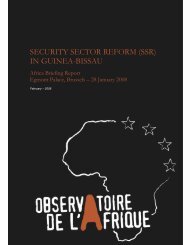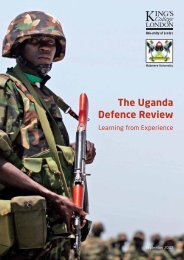AFGHANISTAN'S ELECTION CHALLENGES
AFGHANISTAN'S ELECTION CHALLENGES
AFGHANISTAN'S ELECTION CHALLENGES
Create successful ePaper yourself
Turn your PDF publications into a flip-book with our unique Google optimized e-Paper software.
Afghanistan’s Election Challenges<br />
Crisis Group Asia Report N°171, 24 June 2009 Page 11<br />
$13 million for the 2009 polls – reflects the lack of<br />
trust in the current judicial system. There was considerable<br />
debate over the ECC’s proposed size and scope<br />
with some arguing it should function only at a national<br />
level, others that it should have an investigative and/or<br />
decision-making capacity in the regions or provinces. 79<br />
The latter view prevailed although delayed decisionmaking<br />
– with the UN only announcing its appointees<br />
in April 2009 – meant there was no sub-national presence<br />
by the ECC during the short period available to<br />
challenge candidate eligibility.<br />
For the campaign period beginning 16 June, in which<br />
the ECC adjudicates complaints about alleged electoral<br />
offences, there are around 270 staff, including a<br />
dozen international recruits. As well as the central<br />
headquarters there are eight regional offices, each<br />
with two lawyers and two investigators, as well as<br />
Provincial Electoral Complaints Commissions (PECC)<br />
as the front line for complaints. While all professional<br />
staff had been recruited by mid-June they still lacked<br />
accommodation in every province outside Kabul. 80<br />
The PECCs are descendants of Provincial Election<br />
Commissions (PEC), created in 2005, which unlike<br />
this time, answered to both the JEMB and the ECC.<br />
The personnel – some of whom are being hired again<br />
– have not received further training in the intervening<br />
years.<br />
3. 22The United Nations’ role<br />
The UN’s role in this round of elections is meant to be<br />
purely advisory as well as coordinating international<br />
assistance to all aspects of the poll. The UN Security<br />
Council’s annual renewal of UNAMA’s mandate in<br />
March 2009 charged it to:<br />
79 The final report of the ECC in 2005 (under the chairmanship<br />
of Grant Kippen who returned to the ECC in 2009)<br />
advocated: “The planning and preparation for such a mechanism<br />
should be undertaken well in advance of an election,<br />
including by means of a thorough lessons-learned analysis.<br />
A future electoral complaints body should have the necessary<br />
resources and authority to investigate all complaints on<br />
its own, including at the provincial level, and independently<br />
of the electoral administration”. Electoral Complaints<br />
Commission, Final Report, March 2006, p. 5.<br />
80 Crisis Group telephone interview, Maarten Halff, Election<br />
Complaints Commissioner, Kabul, 16 June 2009.<br />
viding assistance and channelling existing and additional<br />
funds earmarked to support the process. 81<br />
support, at the request of the Afghan authorities,<br />
preparations for the crucial upcoming presidential<br />
elections in particular through the IEC, by providing<br />
technical assistance, coordinating other international<br />
donors, agencies and organisations pro-<br />
International funding is being largely coordinated<br />
through a basket mechanism, Enhancing Legal and<br />
Electoral Capacity for Tomorrow (ELECT), managed<br />
by the United Nations Development Programme<br />
(UNDP). This draws together substantial assistance to<br />
the IEC, with 44 international advisers to the headquarters<br />
and 71 in the field, 82 as well as support to the<br />
ECC, election observation, civic education, media<br />
funding and police training. Altogether 150 international<br />
staff are to be employed, down from 500 in<br />
2005; the failure to retain and build Afghan capacity<br />
is largely responsible for the continued need for such<br />
a large and expensive group. The lack of sustained<br />
preparations also left a shorter period for procurement<br />
and setting up facilities and systems, further driving<br />
up costs. An estimate after the last round of elections<br />
that $100 million would finance five years of electoral<br />
operations, including both presidential and National<br />
Assembly polls 83 is long forgotten. The estimated<br />
cost for the 2009 polls is $225 million 84 – although<br />
this includes additional security costs and wider programs<br />
such as some police training.<br />
85<br />
81 UNSC Resolution 1868, 23 March 2009. The previous<br />
year it had noted delays in preparations, stating that it “encourages<br />
the Afghan Government, with support from the<br />
international community, to accelerate the planning and<br />
preparation of such elections, stresses the need to establish<br />
a permanent Civil Voter Registry (CVR) in accordance<br />
with the Afghanistan Compact, and emphasizes the importance<br />
of free, fair, inclusive and transparent elections in<br />
order to sustain the democratic progress of the country”.<br />
UNSC Resolution 1806, 20 March 2008.<br />
82 Crisis Group email communication, Margie Cook, ELECT<br />
chief electoral adviser, 28 May 2009. For security reasons<br />
Logar, Wardak, Ghazni, Paktika, Khost, Farah, Zabul, Helmand,<br />
Nimroz, Uruzgan, Takhar, Laghman, Nuristan and<br />
Kunar do not have permanent advisers in place.<br />
83 “Post-Election Strategy Group Progress Report”, 27 September<br />
2005, p. 10. “International electoral assistance for<br />
the next five years, including subsidizing the ordinary running<br />
of the IEC, the voter registry and the polling operations,<br />
will be required, and has been estimated at slightly over<br />
$101 million”.<br />
84 There is currently a funding gap of $18 million. The<br />
budget includes a quarantined allocation in the event of a<br />
run-off. ELECT Quarterly Project Report (First Quarter<br />
2009), January-March 2009, UNDP Afghanistan, p. 5. The<br />
U.S. is by far the biggest donor, committing $65 million.<br />
Other major donors include Japan ($36 million), UK ($29<br />
million), Germany ($22 million) and Canada ($20 million).<br />
Ibid, p. 15.<br />
85 “The Situation in Afghanistan and its Implications for<br />
International Peace and Security”, op. cit., p. 3.



